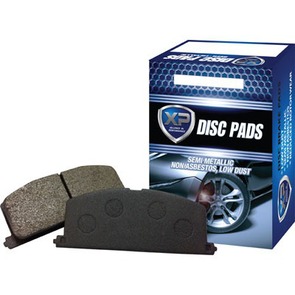Welcome to
On Feet Nation
Members
Blog Posts
Top Content
Demystifying Brake Pads: Understanding Their Importance and Types
When it comes to vehicular safety, few components are as critical as brake pads. These unassuming parts play a pivotal role in ensuring a driver's ability to control their vehicle and bring it to a halt swiftly and securely. In this article, we delve into the world of brake pads, exploring their significance, working principles, and the various types available.
The Significance of Brake Pads:
Brake pads are a fundamental element of the disc braking system, which is widely used in modern vehicles. They serve as the interface between the brake caliper and the brake rotor, generating the friction necessary to slow down or stop a vehicle. When the driver presses the brake pedal, hydraulic pressure is transmitted to the caliper, which then squeezes the brake pads against the rotor. This friction generates heat, converting the kinetic energy of the moving vehicle into thermal energy, effectively reducing its speed.
Working Principles:
The efficiency and effectiveness of brake pads depend on several factors:
Friction Material: Brake pads are composed of a friction material that can withstand high temperatures and provide consistent friction. This material is usually a mix of various compounds, including metals, ceramics, and organic materials. Different types of brake pads are engineered to suit specific driving conditions and performance requirements.
Heat Dissipation: The heat generated during braking can impact the performance of brake pads. Premium brake pads incorporate designs and materials that aid in heat dissipation, preventing excessive heat buildup that could lead to brake fade—a phenomenon where braking efficiency diminishes due to overheating.
Wear and Tear: Brake pads are consumable components that gradually wear out due to the friction they generate. Regular inspection and maintenance are essential to ensure that worn-out brake pads are replaced in a timely manner, preventing potential safety hazards.
Types of Brake Pads:
There are several types of brake pads available, each designed to cater to specific driving needs and vehicle characteristics:
Semi-Metallic: These pads are composed of metal fibers combined with other materials like organic compounds. They offer good heat dissipation and durability, making them suitable for everyday driving and a wide range of vehicles.
Ceramic: Ceramic brake pads are known for their quiet operation and low dust production. They also provide consistent performance across a wide temperature range, making them ideal for urban driving and lighter vehicles.
Organic: Organic brake pads are made from natural materials like rubber, glass, and resins. They are softer and quieter than other types but may wear out faster and produce more dust. They are commonly used in economy vehicles and for low-impact city driving.
Low-Metallic: These pads contain a small amount of metal, enhancing their heat conductivity and overall performance. They strike a balance between semi-metallic and ceramic pads, offering good braking performance and reduced noise levels.
Performance: High-performance brake pads are designed for spirited driving and heavy-duty applications. They often use advanced materials and technologies to provide superior braking power and fade resistance, but they may produce more noise and dust.
In conclusion, brake pads are an indispensable component of a vehicle's safety system. Their proper functioning can mean the difference between a safe stop and a potential accident. Regular maintenance, including inspections and timely replacements, is crucial to ensure the continued reliability of brake pads. When choosing brake pads, considering your driving habits, the vehicle type, and the intended use will help you select the most suitable option to keep you and your passengers safe on the road.
For More Info:-
© 2024 Created by PH the vintage.
Powered by
![]()

You need to be a member of On Feet Nation to add comments!
Join On Feet Nation